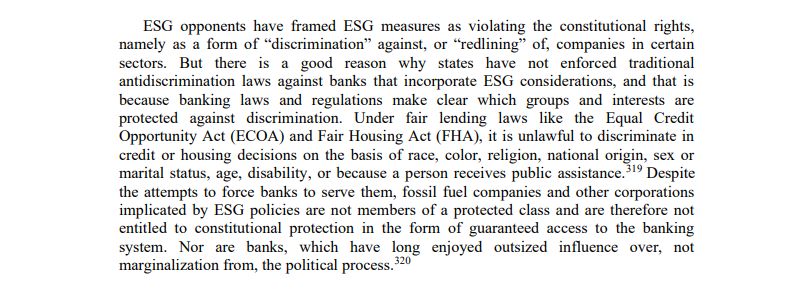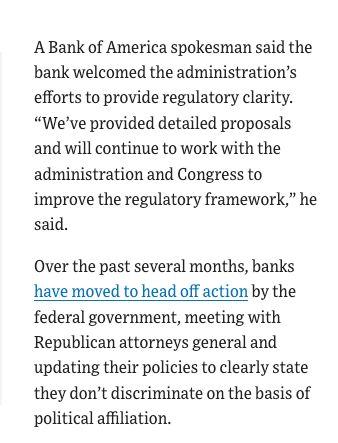This conspiracy theory is rooted in 2 sources: an Obama-era effort to stop payment fraud known as ‘Operation Choke Point’ that implicated certain industries (firearms, payday lending, gambling, tobacco, etc); and banks' voluntary commitments to address gun violence, climate change, and other issues.
Replies
Conservatives accused banks of ‘discrimination’ and ‘redlining.’ They've tried to use federal regulations, state laws, state-constructed blacklists, law enforcement investigations, and jawboning to force banks to do business with energy companies, firearms businesses, crypto, and other industries.
... they're de-facto cartels. And using those cartels as a form of shadow regulation has boomeranged so badly that it's now being used as a cudgel by TERF pressure groups against marginalized LGBTQ creators. (Or were you just sliding that past with that whole "other industries" thing?)
If you're going to ban crypto, and fossil fuels, and firearms...then do it, and do it openly, and explain why you're doing it. "Jawboning" a cartel to do it for you is only ever going to end up harming marginalized people. The people with actual power will always be fine.
Seriously, we're already at the point where they're using their cartel power to stop people from talking about their use of cartel power against "other industries". At the very least, graham, ditch the euphemisms. You're talking about debanking sex workers and adult creators. Admit that much.
First, it's important to understand the Executive Order as an attempt to use the banking system to privilege certain groups and marginalize others. This administration claims (without legal basis) that conservatives are subject to "discrimination" while gutting actual anti-discrimination laws.
Second, the Trump administration's attacks are factually baseless. They are targeting reasonable actions taken by banking regulators and banks to respond to the financial impacts of climate change, financial and illicit finance risks of crypto, and racial discrimination in lending.
Third, Wall Street won't save us. They are eager for tax cuts and deregulation. In exchange, they are happy to work with the Trump Administration to further its agenda of exclusion in the same way some law firms and universities have.
The good news is that this administration's actions create opportunities for future administrations to think more expansively about how the financial system can support goals like racial equity and climate sustainability. Here's a shorter write-up of this issue: blogs.law.ox.ac.uk/oblb/blog-po...




